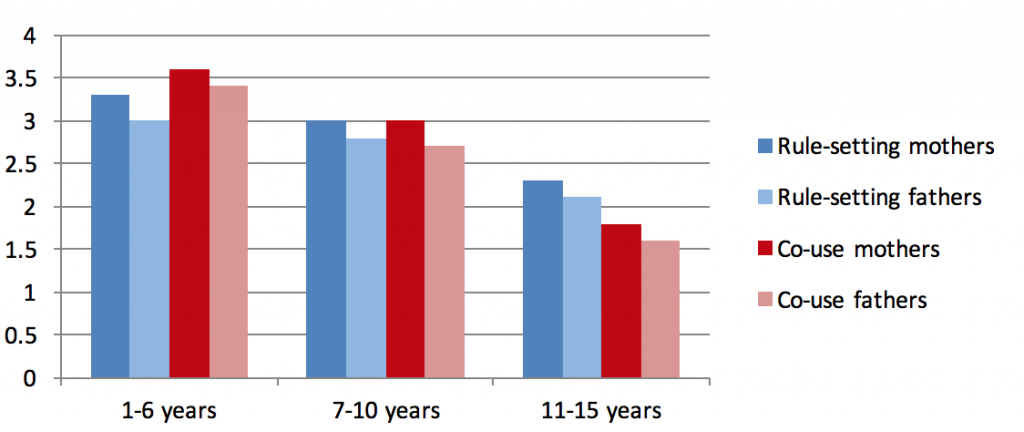 How do mothers and fathers engage with their children’s information and communications technology (ICT) use? Many studies in the past have featured only mothers as respondents. In this post Ruth Festl discusses the findings of two studies exploring how mothers and fathers similarly or differently engage in ICT parenting, providing new insights about how these parental activities relate to the child’s own use and overall family life. Ruth is a Senior Researcher at the Department of Children and Childcare at the German Youth Institute. [Header image credit: C.M. Hoffman_2, CC BY-NC-SA 2.0]
How do mothers and fathers engage with their children’s information and communications technology (ICT) use? Many studies in the past have featured only mothers as respondents. In this post Ruth Festl discusses the findings of two studies exploring how mothers and fathers similarly or differently engage in ICT parenting, providing new insights about how these parental activities relate to the child’s own use and overall family life. Ruth is a Senior Researcher at the Department of Children and Childcare at the German Youth Institute. [Header image credit: C.M. Hoffman_2, CC BY-NC-SA 2.0]
Nowadays, children are growing up with digital media, often having their first contact in early childhood before the age of six. While the role of peers and educational settings becomes more important as a child grows up, usually the family is both the primary setting for first media experiences, as well as a child’s main provider of media education until adolescence. Parents take various actions when regulating their children’s internet use, such as talking with them about online content (active mediation), co-using the internet together with the child, or setting rules regarding content or duration (restrictive mediation).
In this post, I summarise the findings of two studies exploring how mothers and fathers similarly or differently engage in ICT parenting, and how these parental activities relate to the child’s own use and overall family life. As previous research on ICT parenting most often only focused on one parental respondent (mostly mothers), we now have new insights into the interplay between mothers and fathers’ ICT-related parenting. We found that shared mother–child and also father–child online activities were associated with the child having less intensive internet use, and associated with a more positive family climate.
ICT parenting in different age groups
In a study with Alexandra Langmeyer-Tornier, we looked at differences between mothers and fathers’ use of ICT parenting activities for children in different age groups. Until recently there have been few studies regarding very young children (up to the age of six). Based on a representative survey in Germany and an ICT parenting module, we were able to include this young age group (1–6 years) and to look at their specifics compared to older children (7–10 years) and adolescents (11–15 years).
Within the family, mothers co-used the internet with their child more often than fathers, and also set more internet-related rules. The stronger involvement in ICT parenting among mothers was true for all three age groups, although the data also clearly show that both parents’ engagement is lower for children in the higher age groups.
Regulating children’s internet use
For young children (up to the age of six), only mothers but not fathers’ internet co-use and rule setting was found to be relevant for regulating their amount of internet use. It can be assumed that mothers still spend more time at home, especially with their young children, and so also have a stronger influence regarding their ICT parenting. For older, school-aged children, the findings confirmed that fathers play an important role, too. However, instead of mothers or fathers’ rules influencing the child’s reduced internet time, shared parent–child online activities were associated with a lower overall child internet use. It might be that parents perceive the co-use of the internet as an active (instead of restrictive) opportunity to control for and regulate their child’s internet use.
Focusing on the child’s internet use time might not always be the most important thing, since context and content also matter for the quality of time a child spends online. However, this also teaches us that parents using a restrictive method to handle children’s internet use might not necessarily manage to reduce the child’s screen time.
Family life
As children grow up, ICT use becomes a more frequent matter for discussion, often becoming a subject of conflict between the child and parent. In a second study, together with Gabriela Gniewosz, we looked at the role of mothers and fathers’ ICT parenting on the perceived quality of family life. We focused on children aged between 9 and 15 who were also surveyed about their perception of family life in addition to their mothers and fathers’ perceptions. This meant we really could depict the overall perceived atmosphere in the family.
In families where mothers and fathers more often co-used the internet together with their children, there were less family conflicts and a better overall atmosphere. Spending time together with children online can be assumed to have a positive influence on family life.
Benefits from ICT in family life were found to be a matter of mothers and fathers’ self-perceived parenting competence. More precisely, parents who were confident in their own digital skills more often co-used the internet together with their child, which, in turn, meant a more positive family atmosphere.
Looking at the families’ education level, middle- and lower-educated mothers and fathers on average had less confidence in their own digital skills. However, if lower-educated fathers were confident, we could also observe a positive influence of their digital skills on family life via more practiced co-use. Perhaps in families with a middle or lower education level fathers spend more time at home with their children during the day (e.g. due to shift work). This additional time might be associated with more engagement in ICT parenting, at least for fathers with higher self-perceived digital skills.
Most importantly, the findings indicate that within all educational backgrounds, a parent’s ICT engagement is influenced by how confident they feel with their own digital skills.
Conclusions
- From early childhood to adolescence, mothers are more strongly involved in everyday ICT parenting than fathers.
- However, fathers’ digital skills and ICT parenting activities are still important, especially for older children and adolescents’ internet usage.
- Instead of parents setting rules about using the internet, mothers and fathers co-using the internet with their children was more positively related to a reduction in the amount of time children spend online.
- Moreover, shared parent–child online activities were found to have a positive influence on the family atmosphere during middle childhood and adolescence.
- For all education levels, mothers and fathers’ engagement in ICT parenting strongly depended on their confidence in their own digital skills.
This post gives the views of the authors and does not represent the position of the LSE Parenting for a Digital Future blog, nor of the London School of Economics and Political Science.






